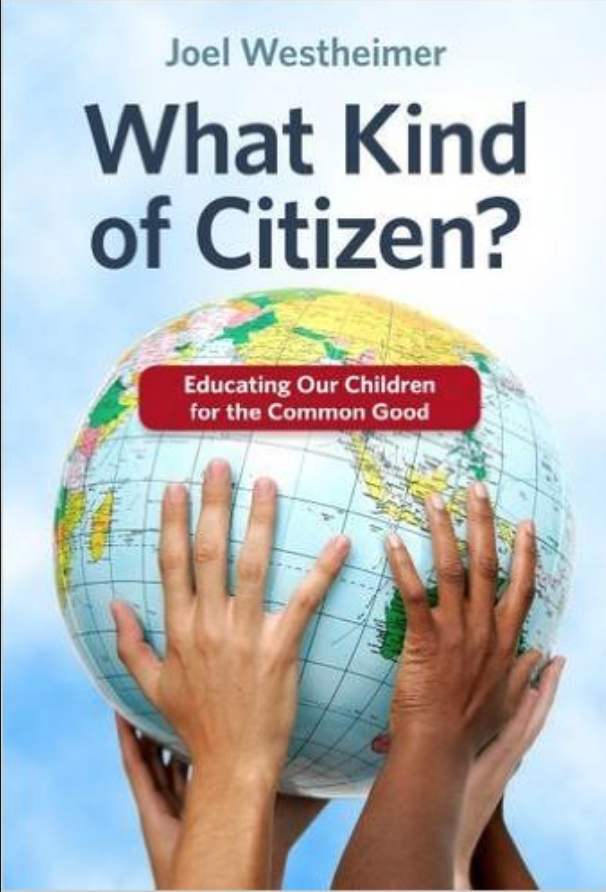
Schools may be vehicles for achieving 
Westheimer suggests several changes we should make in schools. Too often students perceive school as a struggle between the demands adults place on them and their desire to pursue their own passions. To improve students’ experiences schools should seek to be relevant to contemporary problems, offer new interpretations of old “facts”, change students’ perspectives, encourage question asking, embrace controversy, and push for critical thinking. Standardized tests and curricula often demand the opposite—e.g., one correct perspective, deference to authority, and recitation of facts—and yet it is the former set of skills that are likely to help us create a better citizenry, Westheimer argues.
Our push to align curricula and establish accountability has restricted teachers’ autonomy and creativity about what and how they teach. This has contributed to the mistrust of teachers. It reduces teachers’ freedom to act in the best interest of their students. This accountability push has limited students’ learning; rather than being taught a breadth of subjects and deep, critical thinking skills, students drown in reading and mathematics practice. We have become so obsessed with student test scores, according to Westheimer, that every decision about schools and students has come to be justified around those scores. That young kids are coming to school hungry and without access to quality food is not enough of a reason to feed them; we do it because it will increase their test score performance. Westheimer suggests that if we focused less on measuring reading and math skills, educators might create innovative measures of thinking skills that are critical for good citizens.
Westheimer outlines three types of citizens that citizenship education typically seeks to foster. One is the personally responsible citizen who obeys laws, gives to charity, acts conscientiously in his community, and treats others with integrity. The second is the participatory citizen who leads or participates in community organizations or activities with the hope that doing so will improve the community. The final type of citizen is social-justice oriented; she critically analyses structural problems in her community’s social, political, and economic order and thinks independently about causes of and solutions to the problems she sees. The type of citizen that schools try to cultivate is reflective of the society that the school community idealizes. Westheimer argues that the personally responsible citizen alone is not enough to bring about a desirable society; we need people who will get involved in the community and work on the root of problems within it. He gives examples of citizenship programs that effectively taught thinking skills and fostered citizenship skills aligned with local values. These hands-on initiatives have helped students appreciate that the point of learning is to be able to contribute. They helped students to be informed and curious, and they helped ward off our culture’s strong individualistic tendencies.
Westheimer concludes by countering seven common myths about education. Whereas some think that national standards raise the quality of education, educational experiences are contingent upon human connections that we are not currently able to measure well. While we too often mistake order and regimentation for learning, these qualities may not actually promote learning. They do, however, seem to be associated with behavioral problems in kids. Some educators believe that schools must be democratic to teach about democracy but, direct instruction may be equally effective. Some argue that knowledge must precede action; a reciprocal relation and oscillation between action and the pursuit of knowledge may be best. Some mistakenly believe that teaching critical thinking means not teaching facts. We should be teaching facts and basic skills, but do so in meaningful contexts so that students learn facts and how to think about them. Some argue that there is no place for politics in schools; actually, exposing student to a range of political viewpoints will give them an opportunity to think deeply and form their own opinions. Finally, some believe that community-based learning experiences must run smoothly for them to be a good learning experience. Westheimer argues that students benefit from learning about the struggle that goes into contributing to community work.
In Wertheimer’s vision, students who ask questions, consider multiple perspectives, appreciate the malleability of facts, and comfortably engage in controversial issues possess the citizenship skills that will help us shape a better society.
Westheimer, J. (2015). What kind of citizen?: Educating our children for the common good. New York: Teachers College Press.




